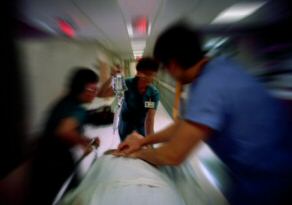
States are lagging in maintaining hospital emergency departments and the public safety that could make them less necessary, according to a report released by a physicians` group Tuesday.
The report -- issued by the American College of Emergency Physicians -- gave states an overall `C-minus` for not doing enough to maintain staffing and funding for emergency rooms. The report also charges that many states have not reined in malpractice lawsuits, a politically touchy issue that has divided the political parties in Congress and in the states.
'The results of this report make it clear that the national emergency health care system needs urgent attention,' concludes the report. 'Their beds are full, their hallways are full, their resources are being stretched to the limit,' said Frederick Blum, the group`s president.
California earned the highest marks, although the group still gave the state only a `B` score. Massachusetts, Connecticut and the District of Columbia also earned `B`s`. Arkansas scored at the bottom with a `D` for what doctors said was weak public funding, a shortage of trauma centers, and a high traffic fatality rate.
ACEP is asking Congress to provide direct funding to help bolster emergency departments. The report graded states on doctor and nursing staff levels, hospital spending, whether or not they have residency training programs in emergency medicine, and other items. The group also took into account public health and safety factors like seat belt and motorcycle helmet laws.
We, and our patients, have suffered the consequences of our overburdened emergency departments. Some of our patients get fed up with the wait and leave before being seen, and getting their symptom diagnosed. Our ER's are already operating at capacity, or above. If there were a disaster (heaven forbid), there is nothing left of reserve capacity to be able to handle it. After all, the hospital cafeteria can only help out so much under even the most adverse circumstances.
No comments:
Post a Comment